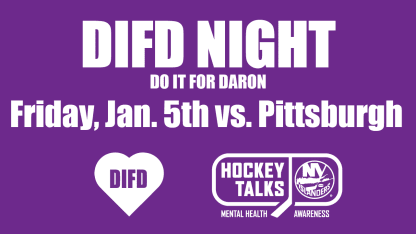It's still hard for Luke Richardson to talk about what happened to his daughter, Daron, but he knows it's important that he does. As much as it pains him to discuss his teenage daughter's suicide, he hopes bringing a dark subject into the light will help others.
That's why he and his wife help steward Do It For Daron, a mental health awareness movement named for his daughter. It's also the reason he wears a purple bracelet - her favorite color - with DIFD written in white block letters.
Richardson, Islanders Do It For Daron
Islanders hosting DIFD night on Jan. 5 to raise money and awareness for mental health initiatives

By
Cory Wright
NewYorkIslanders.com
"People don't know what to say and they're like I'm sorry and I say no no, that's why I wear it," the Islanders Assistant Coach said. "I'm proud of my daughter and I want that message to continue and she's a big part of that."
The Islanders are hosting their first Do It For Daron (DIFD) night on January 5 vs. Pittsburgh, a night devoted to raising money and awareness for mental health.
What is DIFD? It's a youth-driven initiative focused on raising awareness and inspiring conversations about youth mental health. Richardson describes it as a movement, not a foundation. He wants people to talk openly about uncomfortable subjects like suicide and mental health, for more people to seek help and for the proper resources to be available to them.
"It's really just bringing awareness, especially to the youth and making them feel a little bit more comfortable about talking about your feelings," Richardson said. "Mental health and suicide are not very comfortable subjects. It's just starting to get a little bit of traction now and people are starting to feel more comfortable talking about it, but it's still not there."
Watch: Youtube Video
Daron was 14 when she took her life in 2010. It was and still is heartbreaking for Luke, his wife, Stephanie, and daughter, Morgan, who were left searching for answers. No one, from the family, to her friends, teachers and coaches sensed anything was amiss with Daron, who was a likable, beautiful, athletic and as Richardson described, "your everyday goofy teen."
"Everybody was so blown away by this," Richardson said. "People think mental health there's stereotypes, very visible, whether it be addiction based or real serious mental health problems. Daron suffered in silence. We didn't see any signs."
The suffering in silence is why the Richardsons find it so important to encourage conversations.
"If something is bothering you, reach out to someone, whether it's a friend, or a teacher, a coach or someone in your family and just talk about it," Richardson said. "It's really just bringing awareness, especially to the youth, and making them feel a little bit more comfortable about talking about their feelings but knowing they aren't the only one that feels like that and that there's help out there if you do talk about it."
Daron's hockey friends originally started the DIFD movement as a grassroots movement and the Richardson's have helped guide those in need towards the proper clinical support. The Richardsons have also used their platform in pro hockey to raise awareness.
The family organized DIFD and mental health awareness nights everywhere Luke's hockey career has taken him: Ottawa, Binghamton and now with the Islanders. Binghamton continued to host DIFD nights even after Richardson left and other teams, like the OHL's Sarnia Sting, have hosted their own.
DIFD collects the proceeds raised and distributes them to the community where the events take place and partner with mental health organizations in the area. Proceeds from the upcoming Penguins game will go to Northwell Health Systems Mental Health Pediatrics programs.
"We're very adamant that not only creating awareness in that area, but any financial gain on an event, we always make sure that money stays local and works with a local mental health association or hospital and try to do things locally."
Richardson has been very open about his family's story. He, his wife and daughter have become the face for the movement and a subject that's long been taboo and in the shadows. As a result, the Richardsons have been approached by families who want to share their own stories of dealing with mental health.
"We don't have our own answers, let alone answers for them, but maybe it's warming to know that the survivors from suicide, whether it be personal, or family members/friends, are just looking for comfort from other people who have gone through it," he said.
On Friday, Jan 5th we're raising mental health awareness in support of @difdroyal. 💜 Here's how you can help: https://t.co/jsoCJfHUd1
— New York Islanders (@NYIslanders) December 14, 2017
🔹Buy #PITvsNYI 🎟 https://t.co/gxs9YEVqw8
🔸Bid on a VIP suite night experience: https://t.co/W8St0t51Xh pic.twitter.com/42yUl931U2
Anytime it's a positive story of someone reaching out and getting help before it's too late, the Richardsons know they're helping to make a difference.
Richardson sees nights like the one the Islanders are hosting as a way to reach even more people. Having athletes deliver the message can also amplify the impact. He recalls how much feedback DIFD got after John Tavares did a PSA a few years ago. He's a fan of the #BellLetsTalk initiative and sees the steps that mental health awareness has taken over the past few years.
"It's still not a pretty subject and it never will be, but I think the comfort zone of publicly talking about it has gotten better," Richardson said. "It still has a long way to go, but programs like this always bring up the issue that there's not enough help. Now there's some money raised, which is great and we've funded some research projects, some programs that are helpful to schools, students, young athletes and hockey players."
He hopes that having the Islanders relay that message on January 5 helps more people come forward and seek help, preventing tragedies like his own.
For Richardson, "if it saves one person, then it's worth it and that's the way we look at it."


















